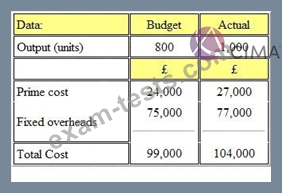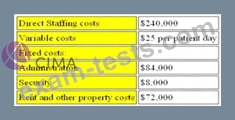Question 36
C Ltd produces a chemical in a single process. Information for this process last month is as follows:
(a) Opening work in progress - 10000 kg valued at £10000 for direct material and £7500 for conversion costs.
(b) Materials input - 25000 kg at £1.10 per kg.
(c) Conversion costs - £17000
(d) Output during the month - 23000 kg.
(e) There were 7500 units of closing work in progress which was complete as to materials and 30% complete as to conversion.
(f) Normal loss for the month was 10% of input and all losses have a scrap value of 80p per kg.
What was the average cost per kg of finished output during the month?
(a) Opening work in progress - 10000 kg valued at £10000 for direct material and £7500 for conversion costs.
(b) Materials input - 25000 kg at £1.10 per kg.
(c) Conversion costs - £17000
(d) Output during the month - 23000 kg.
(e) There were 7500 units of closing work in progress which was complete as to materials and 30% complete as to conversion.
(f) Normal loss for the month was 10% of input and all losses have a scrap value of 80p per kg.
What was the average cost per kg of finished output during the month?
Question 37
Refer to the exhibit.

A company issued its production budget based on an anticipated output of 800 units. Actual output was 1,000 units. The details of the costs are shown below:
The total budget variance was:

A company issued its production budget based on an anticipated output of 800 units. Actual output was 1,000 units. The details of the costs are shown below:
The total budget variance was:
Question 38
A company has spent $5,000 on a report into the viability of using a subcontractor. The report highlighted the following:
A machine purchased six years ago for $30,000 would become surplus to requirements. It has a written-down value of $10,000 but would be resold for $12,000.
A machine operator would be made redundant and would receive a redundancy payment of $40,000.
The administration of the subcontractor arrangement would cost the company $25,000 each year.
Which THREE of the following are relevant for the decision? (Choose three.)
A machine purchased six years ago for $30,000 would become surplus to requirements. It has a written-down value of $10,000 but would be resold for $12,000.
A machine operator would be made redundant and would receive a redundancy payment of $40,000.
The administration of the subcontractor arrangement would cost the company $25,000 each year.
Which THREE of the following are relevant for the decision? (Choose three.)
Question 39
Refer to the exhibit.

X Enterprises runs a private nursing home for the elderly. The company are concerned that bed occupancy rates have been falling over the past 2 years with a consequential effect on profit. They have drawn up a budget for next year as follows:
The nursing home currently charges $90 per patient day.
Based on the budgeted figures and the current charge per day, what would be the break-even point in patient days?

X Enterprises runs a private nursing home for the elderly. The company are concerned that bed occupancy rates have been falling over the past 2 years with a consequential effect on profit. They have drawn up a budget for next year as follows:
The nursing home currently charges $90 per patient day.
Based on the budgeted figures and the current charge per day, what would be the break-even point in patient days?
Question 40
Which of the following industries would not use process costing?

